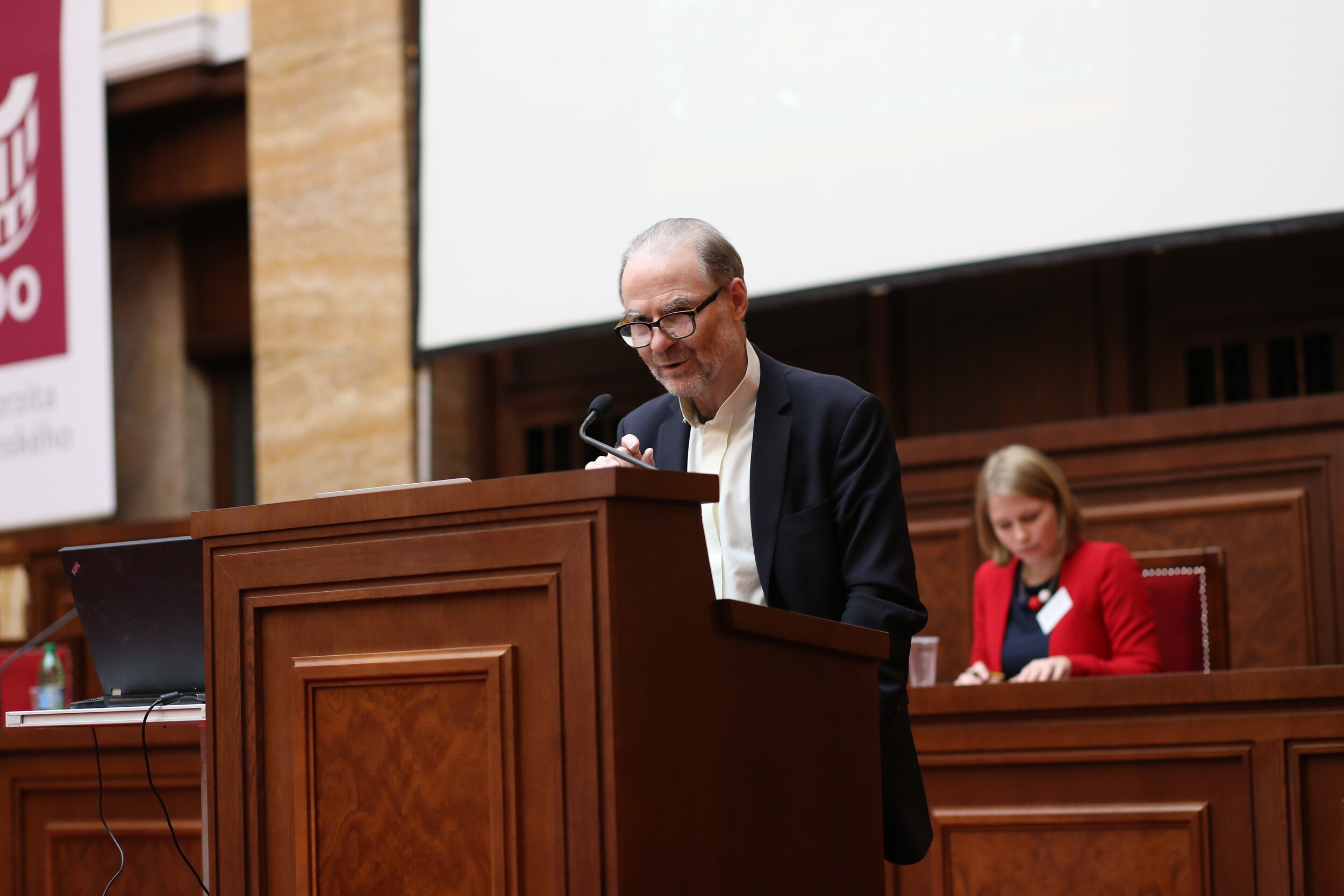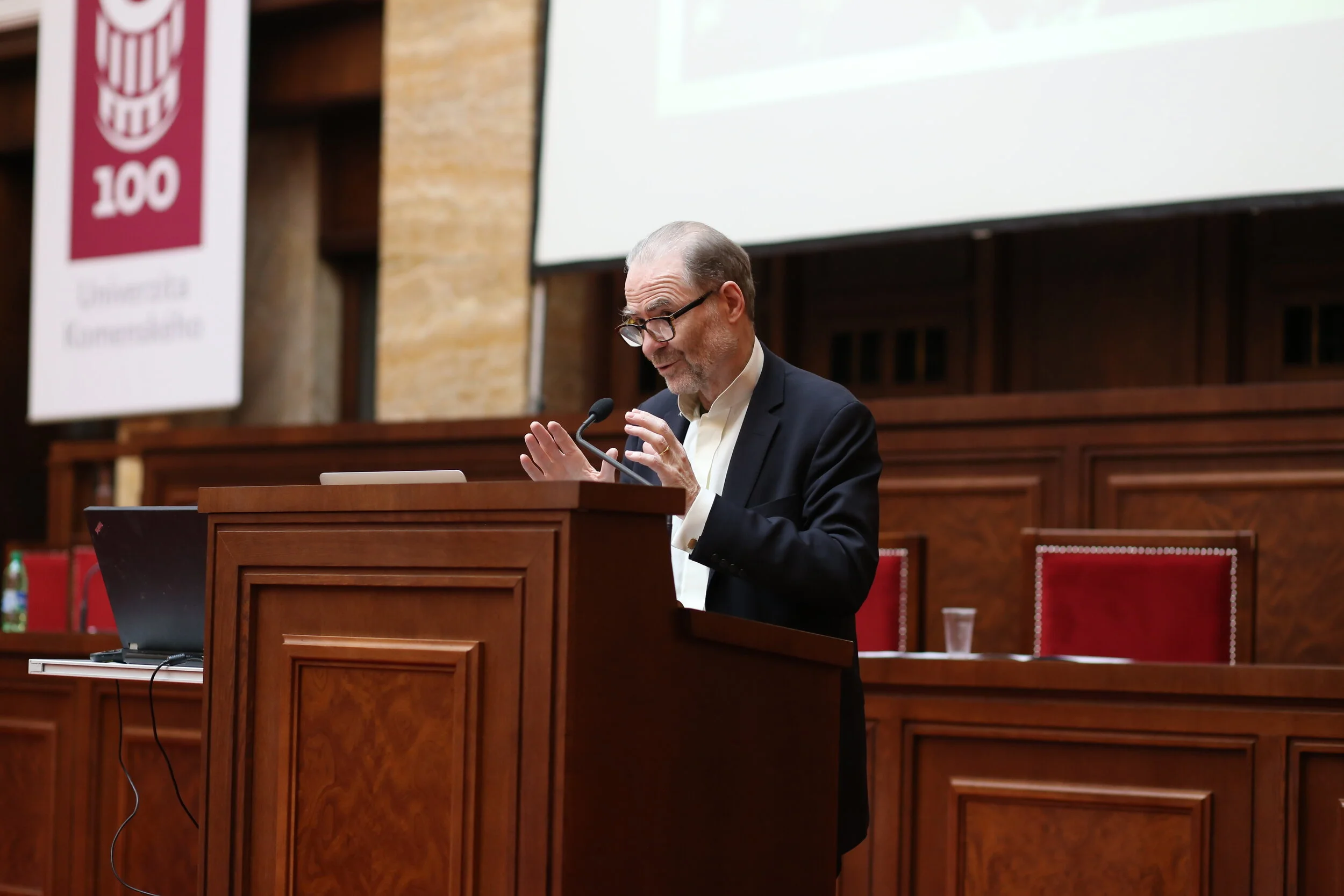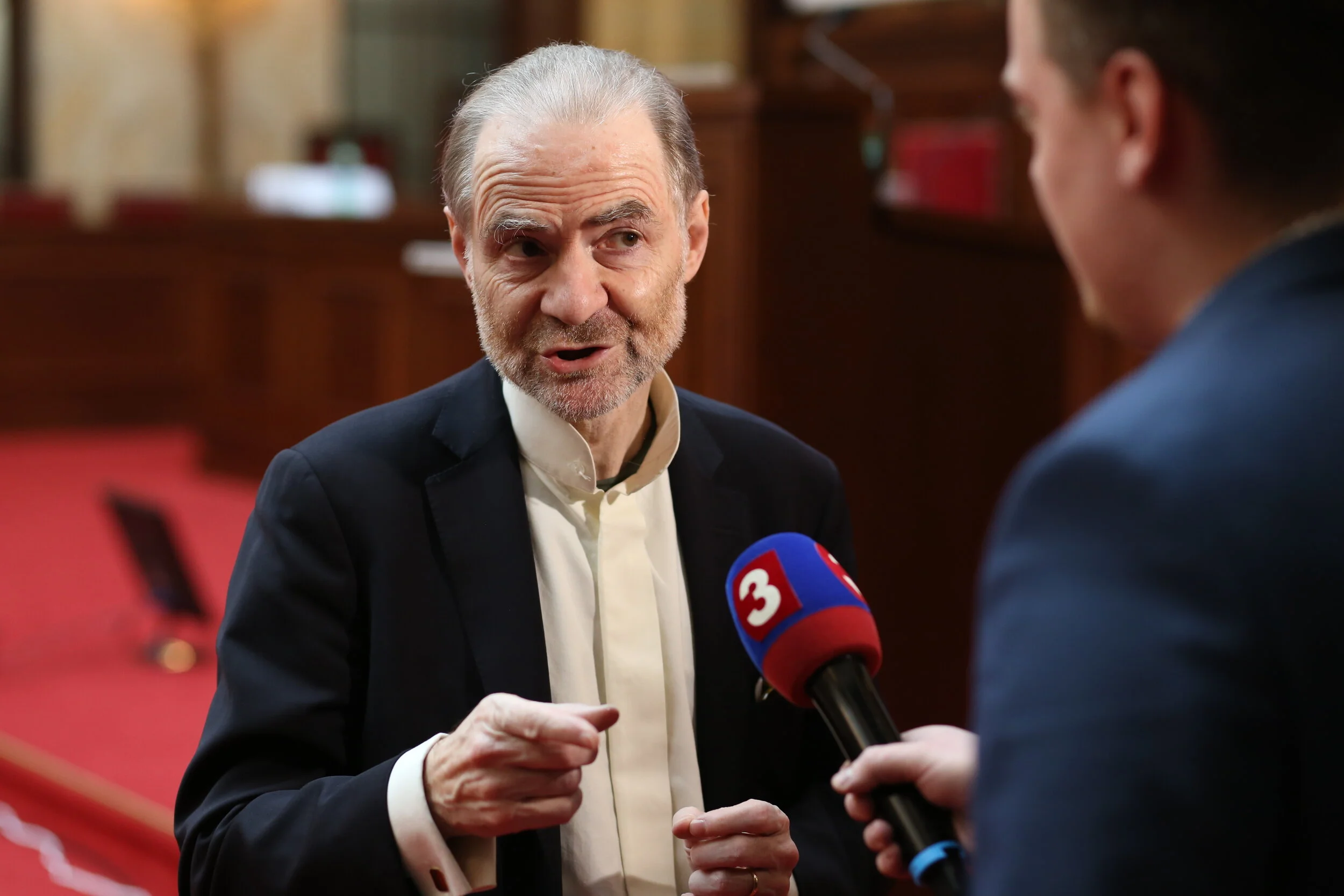INTERVIEW: Timothy Garton Ash on Slovakia: “You are now leading the way in Central Europe”
Timothy Garton Ash giving a lecture at the Comenius University. Author: Martin Bystriansky
Michal Micovčin / February 8, 2020
( 8 min read )
1989 and the Crisis of the Post-Wall World was the title of the lecture that was given by Professor Timothy Garton Ash from the University of Oxford. During his recent stay in Slovakia, he participated at the International Conference on November 89: 30 Years After, which was held at Comenius University and organized by the Institute of History of the Slovak Academy of Sciences. Il Ponte was lucky enough to take part in this event and conduct an interview with Prof. Garton Ash. The given interview was done after the 30-year commemoration of the fall of the Berlin Wall and prior to that of the start of the Velvet Revolution in Czechoslovakia.
Last Saturday was the 30th Anniversary of the fall of the Berlin Wall. In a few days, we will be celebrating another 30th Anniversary (ed.note: the interview was done in early November 2019), the beginning of the Velvet Revolution in Czechoslovakia. How do you perceive these celebrations?
For me, they are still a great celebration because I remember what it meant for people. The real experience of liberation for the Czechs, the Slovaks, and the East Germans. Of course, the question we’re all asking now, is what went wrong over the last 30 years? And I do think we need to have a self-critical examination of what actually went wrong with the “liberal project” that started after 1989.
How was your first-hand experience with the Eastern Bloc and the later revolutions of 1989, that of the Velvet Revolution?
I started traveling behind the Iron Curtain in 1978. Got to know all the major leaders like Václav Havel, Milan Šimečka, Adam Michnik, Lech Walesa, and all the rest. And therefore, I followed very closely what was happening in all these countries. And remember that 1989 was the culmination of 10 years of hard struggle by the dissidents and by the democratic oppositions. A magical culmination after all.
According to a recent poll which was conducted in September under the Institute for Sociology of the Slovak Academy of Sciences, over 30% of Slovaks think that the current political and economic system, in comparison to that prior to the events of 1989, is bad or that they do not have a definite answer. How can we understand this public opinion?
In English there is a saying “The other man’s grass is always greener”, that is to say, people always want what they don’t have, rather than what they do have. So, in the past, they had, perhaps, more security but definitely less freedom. Now, they have more freedom and hanker for more security. To some extent, it’s a natural condition, but beyond that, I would say particularly in Slovakia, the corruption, the fact that the rule of law rarely was not implemented, the extraordinary cronyism between government, business and organized crime; that, I think people see and it makes them very unhappy.
Timothy Garton Ash answering the questions of TA3. Author: Martin Bystriansky
Was something left out or missed during the transformation period from one political and economic system to the other? In the lecture, you mentioned the term “the price of Velvet” …
You have to remember, it was an incredibly difficult thing to turn a communist system with a command economy, and which private property, independent courts, democratic institutions, civil society, independent media, had all been destroyed, back into a halfway decent liberal democratic system. The old joke was “We know you can turn an aquarium into fish soup, but can you turn fish soup back into an aquarium?” So, it was always going to be difficult. Privatization was always going to be complicated. But I think, while some of the problems were probably unavoidable, the incredibly swift and corrupt way in which privatization was done, the failure to establish the rule of law early on in the process, was at least one of the major mistakes, and also the failure of post-communist elites to pay attention, to give respect to the suffering of people who did not do well out of the transition.
In relation to this, what caught my attention in your lecture were the three failures of liberals and the inequality of attention and respect that you have just mentioned. Could you please elaborate more on this for our readers?
I think it’s fascinating that having, as it were, got rid of communism, liberals started making communist mistakes. Number 1, we started to believe we knew the laws of history. That we knew the way history was going. That history is going inevitably towards liberal democracy. Nobody ever knows the direction of history, there were no universal laws of history, and we became complacent as a result. Number 2, liberalism gradually became a kind of a closed system, a closed ideology, internally consistent, but increasingly detached from reality. And that’s, of course, a big mistake that communism made; this system, you can call it neoliberalism if you will, plunged into crisis, starting in 2008. And the third mistake was, you mentioned it already, that we reduced liberalism to the purely economic dimension and liberalism that is only one dimensional is no liberalism at all.
Ok, now, how can we understand the increased support of political parties that are populist, authoritarian, ultra-nationalistic or neo-Nazi in countries like Slovakia?
Obviously, it’s a complex story but two things. First of all, people who have experienced 30 years of constant change; liberalization, globalization, Europeanization, digitalization, the internet revolution…at a certain point, it just becomes too much and they reach back too, they yearn for older sources of community and identity such as the family, the church, the nation. And these are sentiments, entirely understandable sentiments, that populists very skillfully exploit in their electoral appeal and I think that’s one of the major reasons why populists and nationalists are doing so relatively well at the moment. They have a simple, simplistic message.
What is your point in stating that in contemporary times we are witnessing the coming death to liberalism and democracy as such in the “West”?
Paradoxically, my argument is the fact that I have read perhaps twenty books on the death of liberalism over the last few years, shows us that liberalism is alive. In the 1980s, there were no books on the death of communism in East European bookshops and that was actually evidence that communism was dead. In other words, the liberal capacity for self-criticism and constantly refining and reforming itself is one of liberalism’s great strengths. Of course, we now actually have to come up with a new constructive agenda.
Timothy Garton Ash during the lecture at Comenius University, making gesture of solidarity with Hong Kong protesters. Author: Martin Bystriansky
In a recent article you published for The Guardian, you pointed out that the recent events in Slovakia are in the spirit of 1989 of fighting back. How come Slovakia is in a different position than the other V4 countries?
Well, you know, in a way you’re better placed to answer that question, but one obvious explanation is that you had the authoritarian Mečiar years, then had the experience of getting beyond that, and then you had a terrible corruption which Ján Kuciak was exposing and then the absolutely horrifying murder, so, in a way, the fact that things have gone worse here, is the explanation for why Slovakia goes further ahead. Plus, of course, you have a very highly mobilized civil society, you have the experience of mobilization, students also, and you have great independent media like Denník N. So, I do think that you’re now leading the way in Central Europe and I hope that will be followed up in the parliamentary elections next year.
Yes, next February we will have our general elections. What do you consider to be a threat to Slovakia’s democracy? How do you see the future tendencies in Slovakia in relation to this?
Nobody knows. But obviously, your far-right nationalists are very worrying, indeed. I think it will be highly desirable if your two main opposition parties could get together because you face a challenge that we face in Brexit Britain and the opposition to the populists face everywhere, including the United States, which is simply to get our act together.
I would also like to ask about three other contemporary topics that concern the world on a more global level. The first being, what are your proposals for the conclusion to Brexit vis a vis the European Union?
My proposal is that Britain should vote in a second referendum to stay in the European Union and in our election on the 12th of December it will be decided whether there is a majority in parliament for that. So, like you, we face the challenge of getting the opposition’s act together.
The second being, in the lecture you gave yesterday, you mentioned the current situation in Hong Kong. Why did you mention it? How do you see the future of it?
Because here 30 years on, almost to the day, you have people with exactly the same aspirations of the students in Bratislava 30 years ago. They’re going out in the streets with great courage for the same values; for freedom, democracy, and human rights. But alas, their chances of success are much smaller because they don’t have much support from the West and there’s no Gorbachev in Beijing.
The third being: In relation to the year 1989 as a year of protests, that of the contemporary global climate protests like those organized by the Fridays for Future or the Extinction Rebellion movements; what is your stance towards them and their impact on our future on Earth?
Broadly speaking, I think they are great. I think that mobilization is great. I think we haven’t done enough to address climate change. But, don’t underestimate the difficulty of making this change and how much it’s going to cost all of us. I bet you and your contemporaries like to travel. Well, travel is going to be a whole lot more expensive or more difficult. So, I think we should respond to those demands but recognize how challenging it’s going to be and try and turn it into an opportunity for developing a more innovative sustainable economy.
So, what should be done in societies to “fix” the present problems that we discussed in this interview?
Well, we’re like doctors who have spent three years diagnosing the patient, now we have to start coming up with a cure. So what we all need to do, is sit down and say: how do we reform and rejuvenate liberalism, what are the five big things we need to do about inequality, about the power of big corporations, about climate change, about the threat from China, about the problems that come with the internet; and then come up with the answers. And that is in fact what I am working on now.
Thank you very much.
Prof. Timothy Garton Ash. Picture: Courtesy of prof. Garton Ash
Timothy Garton Ash is a Professor of European Studies at the University of Oxford, an Isaiah Berlin Professorial Fellow at St Antony’s College, Oxford, and a Senior Fellow at the Hoover Institution, Stanford University. He is the author of ten books of political writing or “history of the present” which have recorded the transformation of Europe over the past half-century. His essays appear regularly in the New York Review of Books, he writes a monthly column on international affairs in The Guardian and also contributes to The Financial Times, The New York Times, The Washington Post and The Wall Street Journal. His book “The Magic Lantern: The Revolution of ’89 Witnessed in Warsaw, Budapest, Berlin and Prague” (1990) has been republished this year with a new Afterword by the author himself, to commemorate the passing 30 years since the revolutionary year of 1989.







